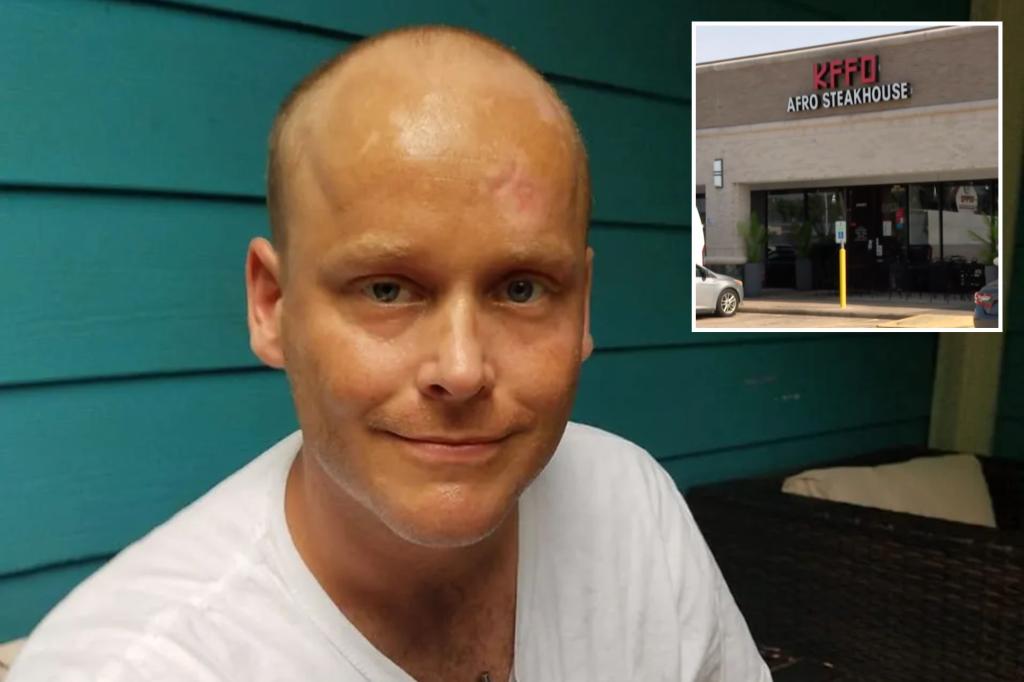A Tragic End: The Jessie Mobley Jr. Story
In a heart-wrenching incident that raises serious questions about human compassion and responsibility, 34-year-old Jessie Mobley Jr. lost his life in the parking lot of KFFO Afro Steakhouse in Houston under circumstances that have left his family devastated and demanding answers. On August 7, Mobley reportedly fell asleep after finishing a meal at the restaurant. Rather than checking on his wellbeing or calling for medical assistance, staff members allegedly assumed he was homeless and carried him outside to the parking lot. They propped him up with his belongings and left him there, where he remained undiscovered until the following morning. By then, it was too late. A beauty school student from the neighboring Behind the Chair Institute made the grim discovery just after 9 a.m., and first responders pronounced Mobley dead at the scene. The restaurant staff’s fatal assumption and subsequent decision not to call emergency services has transformed what might have been a medical emergency into a tragedy that has shattered a family already acquainted with profound loss.
“Why didn’t you call 911?” This question haunts Charlene Fogg-Drake, Mobley’s aunt with whom he lived. Her words echo the sentiments of a family grappling with not just the loss of a loved one, but the manner in which it occurred. Mobley’s parents, Renee and Jessie Sr., are confronting the unimaginable pain of losing their third child in 13 years. Their grief is compounded by the circumstances—a death they believe might have been prevented had someone simply reached out for help instead of making assumptions. “If you don’t know what’s wrong with someone, you shouldn’t assume,” Renee told reporters, her words weighted with sorrow and disbelief. The restaurant owners have declined to comment on the incident, while police are awaiting autopsy results to determine the exact cause of death. For the family, however, the lack of basic human compassion shown that night speaks volumes, regardless of what medical examiners ultimately determine.
The toll of repeated tragedy on this family is visible in both emotional and physical ways. Jessie Mobley Sr., affectionately known as “Big Jessie,” has endured 13 heart attacks, two strokes, required 10 stents, and undergone surgery on his carotid artery over the past decade as grief has ravaged his health. He has lost 60 pounds and reflects with profound sadness that “there’s no aging gracefully after losing a child.” This latest loss adds another layer to their already overwhelming grief. When Renee and Jessie Sr. finally saw their son’s body, they were horrified by its condition. “The way we seen him was horrible. He has turned purple. There were signs of decay,” Renee recounted, describing the additional trauma of seeing their son’s body after it had been left outdoors overnight. These details amplify the family’s conviction that their son was treated with inexcusable neglect and disregard for his humanity.
Mobley was not homeless as the restaurant staff allegedly assumed. He lived with his aunt and was just one week away from celebrating his 35th birthday when he died. Fogg-Drake had been planning a special dinner for him at a waterfront restaurant—a celebration that will never take place. After his death, Mobley was cremated in Houston before his parents brought his ashes back to their home in Spring, Texas, about 25 miles north of Houston. This final journey represents yet another heartbreaking chapter for parents who have now lost three children. Their grief is a testament to the ripple effects of assumptions and inaction—how moments of indifference can lead to irreversible consequences and perpetual sorrow for those left behind.
The space outside the restaurant where Mobley died has become a contested site of remembrance. Fogg-Drake has attempted several times to establish a memorial with flowers and candles to honor her nephew’s memory and mark the place where his life ended so unnecessarily. Yet each time, she reports, the memorial has been dismantled—a final indignity that seems to echo the initial disregard shown to Mobley himself. This ongoing situation speaks to broader questions about dignity in death, the right to memorialize loved ones, and the reluctance some may feel to acknowledge tragic events that occur in spaces of business and commerce. For Mobley’s family, this repeated removal of the memorial represents not just the loss of a physical marker but also an attempt to erase the evidence of what happened to their loved one.
This case highlights profound questions about our collective responsibility toward one another, especially when someone appears to be in distress. It reveals how quickly assumptions about homelessness can lead to dehumanization, with fatal consequences. Mobley’s story forces us to confront uncomfortable truths about social biases and how they manifest in moments of crisis. Had the restaurant staff seen him as a valued customer experiencing a medical emergency rather than a nuisance to be removed, the outcome might have been entirely different. As the Houston Police Department continues its investigation and awaits autopsy results, Mobley’s family remains focused on accountability and awareness. They hope that by sharing their story, others might recognize the potential cost of indifference and the value of responding with compassion rather than assumption when faced with someone in need. Their message is clear: behind every person who appears to be sleeping in public or in distress, there is a human being with a family, a story, and a right to dignity and care.


